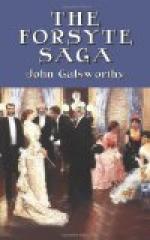Swithin stared at her; a dusky orange dyed his cheeks.
“They’ve no business to be. Some fashionable nonsense!”
And behind this outburst the inarticulate violence of primitive generations seemed to mutter and grumble.
“Tell me what you think of my new star, Uncle Swithin,” said Irene softly.
Among the lace in the bosom of her dress was shining a five-pointed star, made of eleven diamonds. Swithin looked at the star. He had a pretty taste in stones; no question could have been more sympathetically devised to distract his attention.
“Who gave you that?” he asked.
“Soames.”
There was no change in her face, but Swithin’s pale eyes bulged as though he might suddenly have been afflicted with insight.
“I dare say you’re dull at home,” he said. “Any day you like to come and dine with me, I’ll give you as good a bottle of wine as you’ll get in London.”
“Miss June Forsyte—Mr. Jolyon Forsyte!... Mr. Boswainey!...”
Swithin moved his arm, and said in a rumbling voice:
“Dinner, now—dinner!”
He took in Irene, on the ground that he had not entertained her since she was a bride. June was the portion of Bosinney, who was placed between Irene and his fiancee. On the other side of June was James with Mrs. Nicholas, then old Jolyon with Mrs. James, Nicholas with Hatty Chessman, Soames with Mrs. Small, completing, the circle to Swithin again.
Family dinners of the Forsytes observe certain traditions. There are, for instance, no hors d’oeuvre. The reason for this is unknown. Theory among the younger members traces it to the disgraceful price of oysters; it is more probably due to a desire to come to the point, to a good practical sense deciding at once that hors d’oeuvre are but poor things. The Jameses alone, unable to withstand a custom almost universal in Park Lane, are now and then unfaithful.
A silent, almost morose, inattention to each other succeeds to the subsidence into their seats, lasting till well into the first entree, but interspersed with remarks such as, “Tom’s bad again; I can’t tell what’s the matter with him!” “I suppose Ann doesn’t come down in the mornings?”—“What’s the name of your doctor, Fanny?” “Stubbs?” “He’s a quack!”—“Winifred? She’s got too many children. Four, isn’t it? She’s as thin as a lath!”—“What d’you give for this sherry, Swithin? Too dry for me!”
With the second glass of champagne, a kind of hum makes itself heard, which, when divested of casual accessories and resolved into its primal element, is found to be James telling a story, and this goes on for a long time, encroaching sometimes even upon what must universally be recognised as the crowning point of a Forsyte feast—’the saddle of mutton.’
No Forsyte has given a dinner without providing a saddle of mutton. There is something in its succulent solidity which makes it suitable to people ‘of a certain position.’ It is nourishing and tasty; the sort of thing a man remembers eating. It has a past and a future, like a deposit paid into a bank; and it is something that can be argued about.




